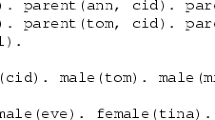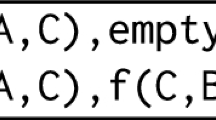Abstract
Inductive Logic Programming is concerned with a difficult problem: learning in first-order representations. If stated in an unrestricted fashion, ILP’s classical learning task, the inductive acquisition of first-order predictive theories from examples, is undecidable; even the more restricted practical tasks are known to be not polynomially PAC-learnable. The idea of using ILP techniques for Knowledge Discovery in Databases (KDD), or Data Mining, where very large datasets need to be analyzed, thus seems impossible at first sight. However, a number of recent advances have allowed ILP to make significant progress on the road to scalability. In this paper, we will give an illustrative overview of the basic aspects of scalability in ILP, and then described recent advances in theory, algorithms and system implementations. We will give examples from implemented algorithms and briefly introduce Midos, a recent first-order subgroup discovery algorithm and its scalability ingredients.
Preview
Unable to display preview. Download preview PDF.
Similar content being viewed by others
References
Rakesh Agrawal, Heikki Mannila, Ramakrishnan Srikant, Hannu Toivonen, and A. Inkeri Verkamo. Fast discovery of association rules. In Usama M. Fayyad, Gregory Piatetsky-Shapiro, Padhraic Smyth, and Ramasamy Uthurusamy, editors, Advances in Knowledge Discovery and Data Mining, chapter 12, pages 307–328. AAAI/MIT Press, Cambridge, USA, 1996.
N. Alon and J. H. Spencer. The Probabilistic Method. John Wiley, New York, 1992.
Hendrik Blockeel and Luc De Raedt. Top-down induction of first-order logical decision trees. Artificial Intelligence, 101(1–2):285–297, 1998.
Uta Bohnebeck, Tamas Horvath, and Stefan Wrobel. Term comparisons in first-order similarity measures. In David Page, editor, Proc. 8th Int. Conference on Inductive Logic Programming (ILP98), Madison, WI, USA, July 1998.
Michael Bain and Stephen Muggleton. Non-monotonic learning. In Stephen Muggleton, editor, Inductive Logic Programming. Academic Press, London, New York, 1992.
Bradley P. Carlin and Thomas A. Louis. Bayes and empirical Bayes methods for data analysis. Chapman and Hall, London, 1996.
Peter Clark and Tim Niblett. The CN2 induction algorithm. Machine Learning, 3(4):261–283, 1989.
William Cohen. Learnability of restricted logic programs. In Stephen Muggleton, editor, Proc. Third Int. Workshop on Inductive Logic Programming (ILP-93), Technical Report IJS-DP-6707, pages 41–71, Ljubljana, Slovenia, 1993. Josef Stefan Institute.
S. Dvzeroski, S. Muggleton, and S. Russell. PAC-learnability of determinate logic programs. In Proc. 5th Annual ACM Workshop on Computational Learning Theory (COLT-92), pages 128–135. ACM Press, 1992.
L. De Raedt and S. DŽeroski. First order jk-clausal theories are paclearnable. Artificial Intelligence, 70:375–392, 1994.
Luc De Raedt and Luc Dehaspe. Clausal discovery. Machine Learning, 26:99ff., 1997.
Sašo Dvzeroski. Numerical Constraints and Learnability in Inductive Logic Programming. PhD thesis, Faculty of Electrical Engineering and Computer Science, University of Ljubljana, Slovenia, 1995.
Peter Flach. A framework for inductive logic programming. In Stephen Muggleton, editor, Inductive Logic Programming, pages 193–212. Academic Press, London, New York, 1992.
Usama M. Fayyad, Gregory Piatetsky-Shapiro, and Padhraic Smyth. From data mining to knowledge discovery: An overview. In Usama M. Fayyad, Gregory Piatetsky-Shapiro, Padhraic Smyth, and Ramasamy Uthurusamy, editors, Advances in Knowledge Discovery and Data Mining, chapter 1, pages 1–34. AAAI/MIT Press, Cambridge, USA, 1996.
Michael R. Garey and David S. Johnson. Computers and Intractability-A Guide to the Theory of NP-Completeness. Freeman, San Francisco, Cal., 1979.
G. Gottlob. Subsumption and implication. Information Processing Letters, 24:109–111, 1987.
Simon Haykin. Neural networks. Prentice-Hall, Englewood Cliffs, NJ, 2nd edition edition, 1998.
Nicolas Helft. Induction as nonmonotonic inference. In Proceedings of the 1st International Conference on Knowledge Representation and Reasoning, pages 149–156, San Mateo, CA, 1989. Morgan Kaufman.
Jörg-Uwe Kietz and Saso Dzeroski. Inductive logic programming and learnability. SIGART Bulletin, 5(1):22–32, 1994.
Jörg-Uwe Kietz. Some lower bounds for the computational complexity of inductive logic programming. In Proc. Sixth European Conference on Machine Learning (ECML-93), pages 115–123, 1993. Also as Arbeitspapiere der GMD No. 718.
Jörg-Uwe Kietz and Marcus Lübbe. An efficient subsumption algorithm for inductive logic programming. In W. Cohen and H. Hirsh, editors, Proc. Eleventh International Conference on Machine Learning (ML-94), pages 130–138, 1994.
Willi Klösgen. Explora: A multipattern and multistrategy discovery assistant. In Usama M Fayyad, Gregory Piatetsky-Shapiro, Padhraic Smyth, and Ramasamy Uthurusamy, editors, Advances in Knowledge Discovery and Data Mining, chapter 10, pages 249–271. AAAI/MIT Press, Cambridge, USA, 1996.
Jörg-Uwe Kietz and Stefan Wrobel. Controlling the complexity of learning in logic through syntactic and task-oriented models. In Stephen Muggleton, editor, Inductive Logic Programming, chapter 16, pages 335–359. Academic Press, London, 1992. Presented at the Int. Workshop on Inductive Logic Programming, 1991. Also available as Arbeitspapiere der GMD No. 503.
J.W. Lloyd. Foundations of Logic Programming. Springer Verlag, Berlin, New York, 2nd edition, 1987.
Stephen Muggleton and Luc De Raedt. Inductive logic programming: Theory and methods. Journal of Logic Programming, 19/20:629–679, 1994.
S. Muggleton and D. Page. A learnability model for universal representations. In Stefan Wrobel, editor, Proc. Fourth Int. Workshop on Inductive Logic Programming (ILP-94), pages 139–160, Schlo\ Birlinghoven, 53754 Sankt Augustin, Germany, 1994. GMD (German Natl. Research Center for Computer Science). Order from http://teuber@gmd.de.
Stephen Muggleton. Optimal layered learning: a pac approach to incremental sampling. In K. Jantke, S. Kobayashi, E. Tomita, and T. Yokomori, editors, Proc. of the 4th Conference onAlgorithmic Learning Theory (ALT93), pages 37–44, Berlin, New York, 1993. Springer Verlag.
Stephen Muggleton. Inverse entailment and Progol. In Koichi Furukawa, Donald Michie, and Stephen Muggleton, editors, Machine Intelligence 14, pages 133–188. Oxford Univ. Press, Oxford, 1995.
Shan-Hwei Nienhuys-Cheng and Ronald de Wolf. Foundations of Inductive Logic Programming. LNAI Tutorial 1228. Springer Verlag, Berlin, New York, 1997.
Frank Olken. Random Sampling From Databases. PhD thesis, Univ. of California at Berkeley, 1993.
Gordon D. Plotkin. A note on inductive generalization. In B. Meltzer and D. Michie, editors, Machine Intelligence 5, chapter 8, pages 153–163. Edinburgh Univ. Press, Edinburgh, 1970.
J.R. Quinlan. Learning logical definitions from relations. Machine Learning, 5(3):239–266, 1990.
J. Ross Quinlan. C4.5 — programs for machine learning. Morgan Kaufman, San Mateo, CA, 1993. Accompanying software available.
L. De Raedt, N. Lavrač, and S. DŽeroski. Multiple predicate learning. In Proceedings of the 13th International Joint Conference on Artificial Intelligence. Morgan Kaufmann, 1993.
J.A. Robinson. A machine-oriented logic based on the resolution principle. JACM, 12(1):23–41, January 1965.
Céline Rouveirol and Jean FranÇois Puget. Beyond inversion of resolution. In Proc. Sixth Intern. Workshop on Machine Learning, pages 122–130, San Mateo, CA, 1989. Morgan Kaufman.
Edgar Sommer, Katharina Morik, Jean-Michel Andre, and Marc Uszynski. What online machine learning can do for knowledge acquisition — a case study. Knowledge Acquisition, 6:435–460, 1994.
Michéle Sebag and Céline Rouveirol. Tractable induction and classification in first order logic via stochastic matching. In Proc. 15th International Joint Conference on Artificial Intelligence, 1997.
Ashwin Srinivasan. Sampling methods for the analysis of large datasets with ILP. Technical Report PRG-TR-27-97, Oxford University, Oxford, UK, 1997.
Irene Stahl. Properties of inductive logic programming in function-free horn logic. In Machine Learning: ECML-94 (Proc. Seventh European Conference on Machine Learning), pages 423–426, Berlin, New York, 1994. Springer Verlag.
Stefan Wrobel and Saso Dzeroski. The ilp description learning problem: Towards a general model-level definition of data mining in ilp. In K. Morik and J. Herrmann, editors, Proc. Fachgruppentreffen Maschinelles Lernen (FGML-95), 44221 Dortmund, 1995. Univ. Dortmund. Research Report 580.
Ruediger Wirth and Paul O’Rorke. Constraints on predicate invention. In Proc. Eighth Intern. Workshop on Machine Learning, pages 457–461, San Mateo, CA, 1991. Morgan Kaufman.
Stefan Wrobel. Concept formation during interactive theory revision. Machine Learning, 14:169–191, 1994.
Stefan Wrobel. Inductive logic programming. In Gerd Brewka, editor, Advances in Knowledge Representation and Reasoning, chapter 5, pages 153–189. CSLI-Publishers, Stanford, CA, USA, 1996. Studies in Logic, Language and Information.
Stefan Wrobel. An algorithm for multi-relational discovery of subgroups. In Jan Komorowski and Jan Zytkow, editors, Proc. First European Symposion on Principles of Data Mining and Knowledge Discovery (PKDD-97), pages 78–87, Berlin, 1997. Springer Verlag.
Author information
Authors and Affiliations
Editor information
Editors and Affiliations
Rights and permissions
Copyright information
© 1998 Springer-Verlag Berlin Heidelberg
About this paper
Cite this paper
Wrobel, S. (1998). Scalability Issues in Inductive Logic Programming. In: Richter, M.M., Smith, C.H., Wiehagen, R., Zeugmann, T. (eds) Algorithmic Learning Theory. ALT 1998. Lecture Notes in Computer Science(), vol 1501. Springer, Berlin, Heidelberg. https://doi.org/10.1007/3-540-49730-7_2
Download citation
DOI: https://doi.org/10.1007/3-540-49730-7_2
Published:
Publisher Name: Springer, Berlin, Heidelberg
Print ISBN: 978-3-540-65013-3
Online ISBN: 978-3-540-49730-1
eBook Packages: Springer Book Archive




